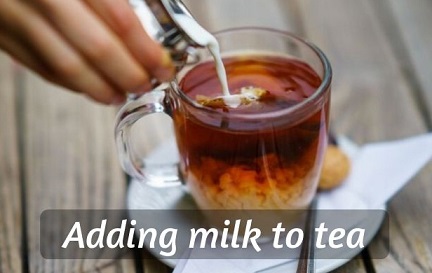Japanese Study Shows That While Black Tea Has Antiviral And Therapeutic Effects Against SARS-CoV-2 Infections, Adding Milk Destroys Its Antiviral Effects!
Nikhil Prasad Fact checked by:Thailand Medical News Team Sep 10, 2023 2 years, 5 months, 4 days, 27 minutes ago
COVID-19 News: In the relentless battle against the ever-evolving SARS-CoV-2 virus, scientists worldwide are striving to uncover novel approaches to combat the pandemic. Among the myriad of potential solutions, an unexpected revelation has emerged from a new study conducted by researchers at Kyoto Prefectural University of Medicine, Fukuoka University, and the Central Research Institute of ITO EN, Ltd., in Japan. This study has unveiled a surprising twist in the tale of black tea, suggesting that its antiviral efficacy against SARS-CoV-2 infections is significantly compromised when combined with milk.
 The Pervasive Threat of SARS-CoV-2 Mutants
The Pervasive Threat of SARS-CoV-2 Mutants
As the world grapples with the COVID-19 pandemic, one constant concern is the emergence of new SARS-CoV-2 variants that have the potential to undermine current preventive measures, therapeutic strategies, and vaccination efforts. These mutants continue to pose substantial global health and socio-economic threats. Given that human-to-human transmission primarily occurs through saliva, identifying beverages that can effectively neutralize the virus in saliva becomes paramount.
Tea as a Promising Antiviral Agent
Intriguingly, prior research and past
COVID-19 News reports had indicated that various types of tea, including green tea and black tea, demonstrated the ability to inactivate SARS-CoV-2 in vitro.
https://www.thailandmedical.news/news/covid-19-therapeutics-computational-screenings-show-a-variety-of-natural-phytochemicals-could-have-efficacy-against-sars-cov-2-including-egcg-from-gre
https://www.thailandmedical.news/news/covid-19-herbs-scientist-study-phytochemicals-found-in-green-tea-such-as-theaflavins-,-catechins-and-myricetins-as-potential-antivirals-against-sars-c
https://www.sciencedirect.com/science/article/pii/S0944711320301185
https://www.mdpi.com/2076-0817/10/6/721
These findings suggested that tea compounds, such as catechins and galloylated theaflavins (gTFs), could bind to the receptor-binding domain (RBD) of the viral S-protein, effectively blocking its interaction with the human receptor angiotensin converting enzyme 2 (ACE2). This interaction inhibition rendered the virus incapable of infecting host cells, providing a glimmer of hope in the battle against the virus.
Black Tea: A Popular Beverage With Unknown Variables
Black tea, in particular, is consumed widely across the globe, with more than 70% of all tea production being dedi
cated to its cultivation. While some regions boast higher per capita consumption of black tea than others, epidemiological analyses have not definitively linked black tea consumption to reduced infection rates or disease severity. This prompted scientists to explore whether additives commonly used with black tea, such as sugar, milk, lemon juice, honey, jam, and cinnamon, might influence its antiviral properties.
The Role of Sugar, Milk, and Lemon Juice in Black Tea
To investigate the impact of these additives, researchers conducted experiments involving the Omicron subvariants of SARS-CoV-2 diluted in human saliva and treated with black tea. Surprisingly, the results showed that while black tea exhibited a significant inactivation effect on the virus, milk, and milk alone, among the additives, completely negated this antiviral effect. Neither sugar nor lemon juice had any substantial influence on the virus's titers.
The Case of Casein: Unveiling the Culprit
The next logical question was to identify the precise component in milk responsible for inhibiting the antiviral activity of black tea. Milk contains a variety of proteins, with caseins being the most abundant. Previous research had suggested that caseins could form complexes with tea catechins. Given the structural similarities between gTFs and catechins, researchers hypothesized that casein might be the key player in hampering the antiviral properties of black tea.
Further investigations confirmed this hypothesis. When a casein solution was added to black tea, it dose-dependently prevented the tea from reducing the virus titer. Importantly, other milk proteins, such as whey proteins, did not exhibit the same inhibitory effect. This specificity implied a unique interaction between casein and the antiviral compounds within black tea.
The Binding of gTFs to Casein
The pivotal question remained: how did casein interfere with the antiviral effect of black tea? The answer lay in the binding of gTFs to casein. When tea/milk was acidified, milk casein precipitated, and the quantification of TFs in the supernatant revealed a significant reduction in both TFs and gTFs concentrations.
This finding strongly suggested that gTFs in tea/milk co-precipitated with casein, confirming the binding of gTFs to casein.
Conclusions
This groundbreaking study sheds light on a previously unexplored facet of black tea's antiviral properties. In vitro experiments revealed that the inactivation effect of black tea on SARS-CoV-2 was entirely nullified by the addition of milk, but not by sugar or lemon juice. The primary culprit behind this unexpected outcome was identified as casein, a predominant milk protein.
Caseins, which constitute a significant portion of milk proteins, are known for their role in calcium and phosphorus transport. Previous research had indicated that caseins could bind to other pathogens, such as human rotavirus and feline calicivirus, rendering them inactive. However, the interaction between casein and gTFs, the antiviral compounds in black tea, had not been previously documented.
The study's findings have far-reaching implications. Firstly, they provide a potential explanation for the lack of a clear negative correlation between black tea consumption and SARS-CoV-2 infection rates or disease severity in epidemiological analyses. The presence of milk in black tea may offset its antiviral benefits, thus diminishing its potential as a protective beverage.
Furthermore, this discovery opens doors to new avenues of research. If tea without milk can effectively inactivate the virus in saliva, it may play a role in reducing viral transmission between individuals. This possibility highlights the importance of further clinical studies to investigate the practical applications of black tea in mitigating the spread of SARS-CoV-2.
In summary, the study conducted by Japanese researchers has unveiled a surprising revelation about the antiviral properties of black tea. While black tea has demonstrated its ability to inactivate SARS-CoV-2, the addition of milk completely nullifies this effect, thanks to the binding of casein to gTFs. This unexpected finding challenges our understanding of black tea's potential role in combating the pandemic and underscores the need for further research to explore its practical applications in reducing viral transmission.
The study findings were published in the peer reviewed journal: Bioengineering.
https://www.mdpi.com/2306-5354/10/9/1068
For the latest
COVID-19 News, keep on logging to Thailand Medical News.
